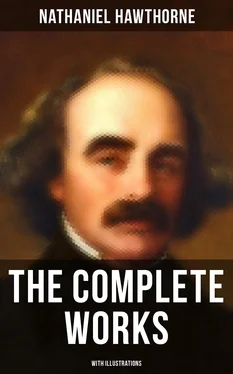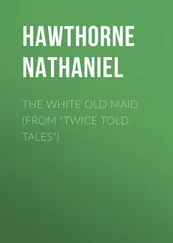At length, something was said by Holgrave that made it apposite for Phoebe to inquire what had first brought him acquainted with her cousin Hepzibah, and why he now chose to lodge in the desolate old Pyncheon House. Without directly answering her, he turned from the Future, which had heretofore been the theme of his discourse, and began to speak of the influences of the Past. One subject, indeed, is but the reverberation of the other.
“Shall we never, never get rid of this Past?” cried he, keeping up the earnest tone of his preceding conversation. “It lies upon the Present like a giant’s dead body In fact, the case is just as if a young giant were compelled to waste all his strength in carrying about the corpse of the old giant, his grandfather, who died a long while ago, and only needs to be decently buried. Just think a moment, and it will startle you to see what slaves we are to bygone times, — to Death, if we give the matter the right word!”
“But I do not see it,” observed Phoebe.
“For example, then,” continued Holgrave: “a dead man, if he happens to have made a will, disposes of wealth no longer his own; or, if he die intestate, it is distributed in accordance with the notions of men much longer dead than he. A dead man sits on all our judgment-seats; and living judges do but search out and repeat his decisions. We read in dead men’s books! We laugh at dead men’s jokes, and cry at dead men’s pathos! We are sick of dead men’s diseases, physical and moral, and die of the same remedies with which dead doctors killed their patients! We worship the living Deity according to dead men’s forms and creeds. Whatever we seek to do, of our own free motion, a dead man’s icy hand obstructs us! Turn our eyes to what point we may, a dead man’s white, immitigable face encounters them, and freezes our very heart! And we must be dead ourselves before we can begin to have our proper influence on our own world, which will then be no longer our world, but the world of another generation, with which we shall have no shadow of a right to interfere. I ought to have said, too, that we live in dead men’s houses; as, for instance, in this of the Seven Gables!”
“And why not,” said Phoebe, “so long as we can be comfortable in them?”
“But we shall live to see the day, I trust,” went on the artist, “when no man shall build his house for posterity. Why should he? He might just as reasonably order a durable suit of clothes, — leather, or guttapercha, or whatever else lasts longest, — so that his great-grandchildren should have the benefit of them, and cut precisely the same figure in the world that he himself does. If each generation were allowed and expected to build its own houses, that single change, comparatively unimportant in itself, would imply almost every reform which society is now suffering for. I doubt whether even our public edifices — our capitols, state-houses, court-houses, city-hall, and churches, — ought to be built of such permanent materials as stone or brick. It were better that they should crumble to ruin once in twenty years, or thereabouts, as a hint to the people to examine into and reform the institutions which they symbolize.”
“How you hate everything old!” said Phoebe in dismay. “It makes me dizzy to think of such a shifting world!”
“I certainly love nothing mouldy,” answered Holgrave. “Now, this old Pyncheon House! Is it a wholesome place to live in, with its black shingles, and the green moss that shows how damp they are? — its dark, low-studded rooms — its grime and sordidness, which are the crystallization on its walls of the human breath, that has been drawn and exhaled here in discontent and anguish? The house ought to be purified with fire, — purified till only its ashes remain!”
“Then why do you live in it?” asked Phoebe, a little piqued.
“Oh, I am pursuing my studies here; not in books, however,” replied Holgrave. “The house, in my view, is expressive of that odious and abominable Past, with all its bad influences, against which I have just been declaiming. I dwell in it for a while, that I may know the better how to hate it. By the bye, did you ever hear the story of Maule, the wizard, and what happened between him and your immeasurably great-grandfather?”
“Yes, indeed!” said Phoebe; “I heard it long ago, from my father, and two or three times from my cousin Hepzibah, in the month that I have been here. She seems to think that all the calamities of the Pyncheons began from that quarrel with the wizard, as you call him. And you, Mr. Holgrave look as if you thought so too! How singular that you should believe what is so very absurd, when you reject many things that are a great deal worthier of credit!”
“I do believe it,” said the artist seriously; “not as a superstition, however, but as proved by unquestionable facts, and as exemplifying a theory. Now, see: under those seven gables, at which we now look up, — and which old Colonel Pyncheon meant to be the house of his descendants, in prosperity and happiness, down to an epoch far beyond the present, — under that roof, through a portion of three centuries, there has been perpetual remorse of conscience, a constantly defeated hope, strife amongst kindred, various misery, a strange form of death, dark suspicion, unspeakable disgrace, — all, or most of which calamity I have the means of tracing to the old Puritan’s inordinate desire to plant and endow a family. To plant a family! This idea is at the bottom of most of the wrong and mischief which men do. The truth is, that, once in every half-century, at longest, a family should be merged into the great, obscure mass of humanity, and forget all about its ancestors. Human blood, in order to keep its freshness, should run in hidden streams, as the water of an aqueduct is conveyed in subterranean pipes. In the family existence of these Pyncheons, for instance, — forgive me Phoebe, but I cannot think of you as one of them, — in their brief New England pedigree, there has been time enough to infect them all with one kind of lunacy or another.”
“You speak very unceremoniously of my kindred,” said Phoebe, debating with herself whether she ought to take offence.
“I speak true thoughts to a true mind!” answered Holgrave, with a vehemence which Phoebe had not before witnessed in him. “The truth is as I say! Furthermore, the original perpetrator and father of this mischief appears to have perpetuated himself, and still walks the street, — at least, his very image, in mind and body, — with the fairest prospect of transmitting to posterity as rich and as wretched an inheritance as he has received! Do you remember the daguerreotype, and its resemblance to the old portrait?”
“How strangely in earnest you are!” exclaimed Phoebe, looking at him with surprise and perplexity; half alarmed and partly inclined to laugh. “You talk of the lunacy of the Pyncheons; is it contagious?”
“I understand you!” said the artist, coloring and laughing. “I believe I am a little mad. This subject has taken hold of my mind with the strangest tenacity of clutch since I have lodged in yonder old gable. As one method of throwing it off, I have put an incident of the Pyncheon family history, with which I happen to be acquainted, into the form of a legend, and mean to publish it in a magazine.”
“Do you write for the magazines?” inquired Phoebe.
“Is it possible you did not know it?” cried Holgrave. “Well, such is literary fame! Yes. Miss Phoebe Pyncheon, among the multitude of my marvellous gifts I have that of writing stories; and my name has figured, I can assure you, on the covers of Graham and Godey, making as respectable an appearance, for aught I could see, as any of the canonized bead-roll with which it was associated. In the humorous line, I am thought to have a very pretty way with me; and as for pathos, I am as provocative of tears as an onion. But shall I read you my story?”
Читать дальше












